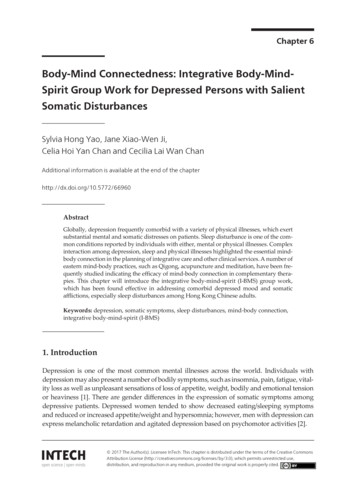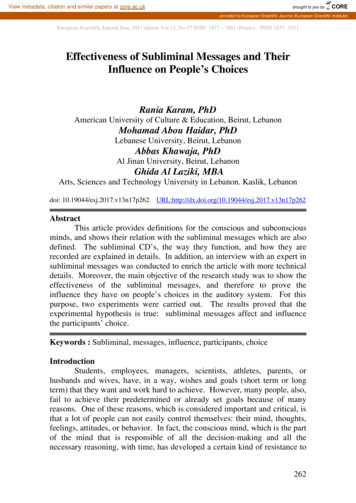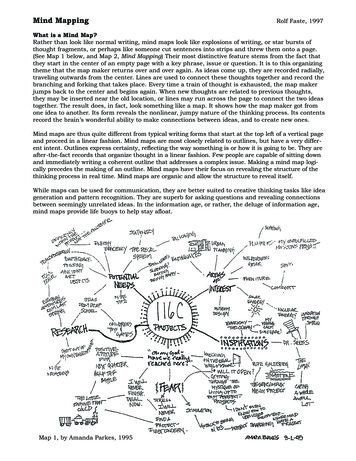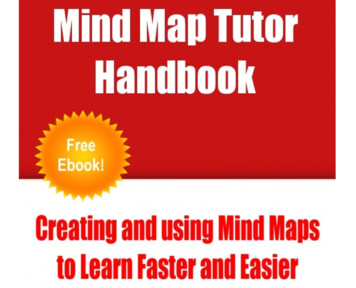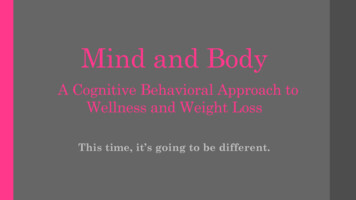
Transcription
Mind and BodyA Cognitive Behavioral Approach toWellness and Weight LossThis time, it’s going to be different.
This time, it’s going to be different.This time, you are going to change the way you thinkabout food and eating which can help you remainsteadfast on your dietary plan and overall wellnessactivities.The Beck Diet Solution teaches people how to applythe proven benefits of Cognitive Therapy to eatinghabits and overall wellness activities. In fact,Cognitive Therapy is a psychological method shown tohelp people keep off excess weight once they lose it.The Beck Diet Solution will change the way youthink about eating and weight loss – forever!2
Disclaimer andAcknowledgementsThis program is anadaptation of the BDS. Thefacilitators are not BDSTrained Coaches. J Beck, 2008. Adapted fromThe Beck Diet Solution andused with permission.www.beckdietsolution.com4
Preparation is KeyThrough Mind and Body people are taught to expect challenges – andprepare for them ahead of time – and are able to persevere and getthrough these temporary difficulties. People will be equipped withpreparatory tasks and skills – before they even start dieting or a wellnessplan. This preparation teaches you exactly what to do when dieting getshard. You’ll be able to face challenges with confidence because you knowhow to get through them, and each time you do, dieting will become easierand easier.5
Components of the Program Mind and Body is a psychological program, not a food plan. It doesn’t tell you what to eat – you can choose any nutritious dietyou want. Mind and Body teaches you how to be successful implementing youreating and overall wellness plan. It shows you how to talk back to the I don’t want to, I don’t have to,or I can’t voice in your head. With the comprehensive, step-by-step program in this book, you’ll bebetter able to stay on your diet, lose weight, and maintain yourweight loss for life.6
Cognitive Behavioral Therapy CBT is a category of therapy models that focuses on examining therelationships between thoughts, feelings, and behaviors. Cognitive Therapy is one of those. Judith Beck is the daughter ofAaron Beck who founded Cognitive Therapy. There are others, including Rational Emotive Behavior Therapywhich was founded by Albert Ellis. By exploring patterns of thinking that lead to self-destructive actionsand emotions people can modify their patterns of thinking resultingin the management of emotions and healthier behavioral choices. You can learn how to diet successfully.7
Strategies of Cognitive Therapy Setting Goals The more specific a goal, the more likely you are to achieve it Ambitious goals are good, but overly ambitious goals can be discouraging Regular feedback on progress improves outcomes Self-monitoring Notice barriersPay attention to physical cuesIdentify challenges to changing your behaviorKeep a logFeedback and reinforcement Can provide motivation Help you adjust behavior Help keep your expectations ambitious but realistic8
Strategies of Cognitive Therapy Boosting the belief that you can do it Positive attitude Build confidence Surround yourself with people in similar circumstances Incentives Give yourself credit every time you achieve a goal Treat yourself when you reach a markerMind and Body teaches you how to cope with hunger, cravings, stress, andstrong negative emotions without turning to food for comfort. You’ll alsolearn how to motivate yourself to do all the things you need to do to dietsuccessfully and carry out your wellness plan — by changing the way youthink.9
ActivatingEventConsequenceEmotionalandBehavioral reactionsSituationsIrritation, disappointmentvs. anger, depression,guilt, anxiety10
ActivatingEvent (Awareness)BeliefSystemConsequence(Assign Meaning to “A”)I wish I desire I prefer Situations/ Events/CircumstancesPreference not metI Must have PreferenceI must You must The world must Positive Emotional/Behavioral ResponseNegative Healthy E/BResponseNegative Unhealthy E/BResponse11
Development of Emotional and Behavioral ReactionsPerception is05/30/2010Mark S. DeBord, LCSWPerception isIssue/ Event/ SituationBad!Bad!As bad as this may be, blessingsand good remain - now and infuture possibilities!What a catastrophe!This isunovercomeable!What aLoser!Perception isGood!I can’t stand this!IsAlthough I don’t like it when Ido, everyone makes mistakes.As bad as this may be and asmuch as I don’t like it, I canstand it and God can handle it!G1Emotional Pain:anxiety, guilt,anger, anddepression.Emotional Pain:Emotional Resultconcern, remorse,irritated and sad.Is Pleasant!Ineffective Behaviors:aggression, inactivity,distancing, worry, self-loathingEffective Behaviors: problem-solving, askfor change, plan for similar events,connect with others, learn, make choices12
Sabotaging Thoughts I know I shouldn’t eat this, but I don’t care. It’s okay if I eat [this food] just this one time. I’ve had such a hard day, I deserve to eat this. I can’t resist this food. I’m upset. I have to eat. I ate something I shouldn’t. I may as well blow my diet for the rest ofthey day. This is hard. I don’t want to keep dieting. I’ll never lose weight.13
Chapter 1: The Key to Success Have you blamed yourself or your diet for not succeeding in losingweight in the past? Did that blame enhance your success? Once you know how to diet, you’ll be more successful in changing youreating habits and implementing your wellness plan. Weight loss - regain is a cycle that you can stop.14
How Cognitive Therapy Works Cognitive Therapy is based on the concept that the way people thinkaffects how they feel and what they do.I’mhungryI’mhungryI can’tstand it! Ihave to eat!Grab thenearestfoodIt’s allright. Ican wait.Wait untilyour nextmeal.15
Common problems people face You finished all the food on your plate, but you didn’t feel satisfied. You felt upset and thought that eating would make you feel better. You were too tempted by the sight of food when shopping at thesupermarket. You were too tired to cook, so you opted for fast food instead. You were too polite to turn down the dessert that your friend baked. You were at a party and felt like treating yourself. You were offered free food and felt obligated to take advantage.16
Psychological Problems PeopleFace Feeling overwhelmed by the requirements of your diet Feeling deprived Feeling discouraged when you don’t lose weight consistently or loseas much weight as you had hoped Feeling stressed by other life problemsYou can learn how to resist the urge to overeat when you’re confrontedwith cravings, hunger, stress, social pressures, and myriad otherproblems.17
How Mind and Body Works Whether you’re depressed or content, a stay-at-home or workingparent, a binge eater or social eater, a dieting novice or dieting pro,Mind and Body can help you. The way you think about food, eating, and dieting affects yourbehavior and how you feel emotionally. Certain ways of thinking make it difficult to follow a diet and tomaintain weight loss. With Mind and Body, you’ll learn one new skill every day. By the endof six weeks, you will have learned how to change sabotagingthoughts (that cause you to stray from your diet) to helpful thinking(that will lead to success).18
How to Use Mind and Body A Program for Everybody – It doesn’t matter if you want to lose 5 or100 pounds, or if you just want to maintain your weight. It doesn’tmatter if you are male or female, young or old. It doesn’t matter ifthis your first or tenth diet, or whether you’ve been dieting on and offforever. This program is designed to help you solve the problems thathave made dieting/ wellness activities difficult for you in the past.19
A Task a Day You’ll have a new task to complete everyday for the next six weeks. You’ll perform some tasks only once and others you will do daily orweekly. Progressing one day at a time helps you to learn one skill beforemoving on to the next. It takes time to let new ideas sink in and to become proficient atchanging your ideas and behavior.20
Skills for Week 1 AdvantagesCard Sit down to eat Eat Slowly and Mindfully Give yourself credit21
Session 2Mind and Body22
No Lost CausesIn the past, you may have been able to make short-term changes inyour eating habits to help you lose weight. But when the going gottough, you abandoned those changes because you didn’t know how totalk back to such sabotaging thoughts as:Dieting is too hard!I have to eat this. I have no self-control.I don’t want to hurt her feelings, so I’ll eat what she made.I can’t diet when I’m stressed.23
Chapter 2: What Really Makes YouEat Eating is not automatic. You don’t decide to let your heart beat, you do decide to eat. You can learn how to take better control of your eating decisions.24
Thoughts Come First Although you may not be conscious of it, you always have a thoughtbefore you eat. Your thoughts influence what you do. If you think, I really want to eat that it won’t matter just this once,and you don’t dispute those thoughts, you’ll go ahead and eat it. If you think, I really want to eat it, but I shouldn’t because it’s not onmy diet I want to get better at resisting food between meals, thenyou won’t eat it. Sabotaging thoughts lead you to act in unhelpful ways. Helpful thoughts lead you to act in more productive ways.25
How Thoughts Can Sabotage YourDietTypes of sabotaging thoughts1. Permission-giving thoughts allow you to rationalize what you eat:I shouldn’t eat this, but it’s okay because 2. Thoughts that undermine your confidence:It’s so terrible that I ate that I’m so weak I may as well giveup now.3. Thoughts that allow you to disregard advice:I really don’t have to do this task I can lose weight without doingthis task.4. Thoughts that increase your general level of stress:I should always do things perfectly I should always makeeveryone happy.26
Which Muscle Are YouStrengthening?Resistance Muscle vs. Giving-In Muscle27
Eating Begins with a Trigger Sabotaging thoughts arise when you’re confronted with a trigger, asituation that stimulates your thinking. Environmental Triggers: seeing or smelling food Biological Triggers: hunger, thirst, or cravings Mental Triggers: thinking about food, imagining food in the future Emotional Triggers: pleasant feelings associated with eating Social Triggers: people who urge you to eat in unhelpful ways28
How to Deal with Triggers Modify your eating environment. Tolerate hunger and craving. Think differently about food. Deal with your emotions in a productive way. Make healthy choices a higher priority than pleasing other people orsatisfying a momentary desire.29
From Triggers to EatingYou encounter atrigger:Someone offers you apiece of cake.You have a thought:That cake looksgood.You make a decision:I think I’ll have it.You act:You eat the cake.30
Remember:Just as the decision to eatcan reduce tension, thedecision not to eat can alsoreduce tension!31
Week 1Get Ready: Lay the Groundwork32
Day 1Task: Record the advantages of losing weight onyour first Response Card Response Cards contain important written messages to help you counteryour sabotaging thoughts. They also help you motivate yourself every day. What are some of the benefits of losing weight?As you start to lose weight,you’ll undoubtedly discover additionalbenefits along the way.33
My Advantages Response Card1. I’ll look so much better.2. I won’t be so self-conscious all the time.3. I’ll feel more confident.4. My doctor won’t bug me.5. I won’t feel embarrassed at the swimming pool.6. I’ll be healthier.7. I’ll have more energy.8. I’ll be happier when I look in the mirror.9. I’ll feel in control.10. I’ll be able to wear my old clothes.11. I’ll be proud of myself.Example of an Advantages Response CardAdd more to it throughout the process34
Use Your Advantages ResponseCard Daily, at scheduled times. Whenever you find yourself struggling with cravings, temptation, orsabotaging thoughts. Remember to read your Advantages Response Card! Motivate yourself to read your Advantages Response Card daily. Face reality!What are you thinking?35
What are you thinking?1.ST - I don’t need to remind myself of the reasons to lose weight, Iknow them.HT – There are times I choose not to think about them which hindersmy reaching my goal. I will do better to purposefully remind myselffrequently and have them in writing when I am temped to chooseshort-term comfort.2.ST – I don’t feel like doing this. It is too much trouble.HT – Is it really that much trouble. There are many thingsworthwhile that I don’t necessarily feel like doing, but I am generallyglad I did once the task is complete.36
Day 2Task: Pick Two Reasonable Diets One you plan to start with One in case the first doesn’t work outAll diets enable weight lossin the same way – by getting youto eat fewer calories.37
Two Basic Types of Diets Set eating plan – provides a detailed prescription for meals andsnacks. Counting system – allows you to design your own meals and snacks,as long as you stay within a certain number of calories.Do you function better if youhave set rule to follow?Or do you do better with more flexibility? The bottom line is that you’ll be taking in a limited number ofcalories.38
Day 3Task: Eat Sitting Down All calories add up! Today you will make the commitment to sit down every single timeyou eat something – even if it’s just a bite. This exercise will help you become more conscious of everything youput in your mouth. You’ll feel more satisfied. It’s important to see all of your food spread in front of you. Psychological Satisfaction How to sit consistently: make it a goal – remind yourself of benefit39
What are you thinking? ST – It’s okay if I eat standing up this one time. I’ll eat my nextmeal sitting down.HT – I don’t become a bad person if I stand up and eat, but if I want tochange habits that have kept me from my weight goals, I will do bettersitting down. ST – I enjoy spontaneous munching and that is done best standing inthe kitchen.HT – I may enjoy it, but it is getting in the way of my losing weight;therefore, I will remind myself of my goals (Advantages Card) and sitdown to eat, because I am more aware of what I eat when I do.40
Day 4Task: Give Yourself Credit How and When to Give Yourself Credit It can be a brief word or phrase – Way to go! Great job!Start today!You deserve credit every time you don’t engage in unhelpful behaviors.Write down the word “credit” on a sticky note.Once or twice a day, get out your diet notebook.Say something positive every time you check off an item on your to-do list.Reflect on your eating behaviors whenever you finish a meal or snack.Buy a small counter to keep track of every time you deserve credit.41
What are you thinking? ST – I don’t deserve credit for doing things that I should be doingalready.HT – If I don’t give myself credit for these essential behavioral choices,I will give more attention to the barriers and end up practicing theineffective behaviors more than these essential behaviors. ST – It feels too unnatural and juvenile to give myself credit.HT – The more I practice something, the more natural it will feel.Credit builds confidence. I am the only one judging this a juvenile.There is no rule or law that describes giving one’s self credit asjuvenile. ST – I don’t deserve credit until I reach my goal.HT – Credit for small steps helps keep motivation/ momentum.42
Day 5Task: Eat Slowly and Mindfully When you eat slowly, your brain has time to register that you’re full. When you notice and enjoy every mouthful, you feel more satisfied whenthe food is gone.How to Slow Down Change something in youreating environment. Set a timer to beep every one tothree minutes. Take sips of water after everyfew bites. Eat something hot. Pay attention to your body. Look at the clock.43
What are you thinking? ST – I eat fast. That is just the way I am.HT – Eating fast has contributed to my weight. If I want to reach mygoal, I can learn to eat more slowly. I might even learn to enjoy it. ST – I truly don’t have time to eat slowly.HT – I need to rearrange my time so I can manage my time such that Ican eat more slowly. I make time for what is a priority (reviewAdvantages Card). If there were an emergency, I would certainly taketime for that.44
Day 6Task: Find a Diet Coach Your diet coach can: Encourage youBuild your self-confidence/ Praise youHelp you solve problemsKeep you accountableHelp you take a more useful perspectiveHow to find a diet coach: Enlist the help of a close friend of family memberConsider starting this program with a friend or family memberJoin an organized groupFind a diet professionalInvestigate Internet support45
What are you thinking? ST – I don’t want to impose on someone.HT – It could actually prove to be of benefit to the both of us. It couldbe a way for us to better connect and maybe I could be supportive tothem in some way. They will tell me “no” if they cannot do it – whichmay be disappointing, but not the end! ST – I should be able to do this myself.HT – Maybe I can do this myself, but it is often easier and moreconsistently done with support and encouragement.46
Day 7Task: Arrange Your Environment Prepare your home and work environment by putting tempting foodswhere you won’t easily see them – and by putting wholesome foodsallowed by your diet in plain view. “Out of sight, out of mind.” Changes at home Remove personal temptations, rearrange dishes, consider others, getcreative Changes at work Place treats in cabinets, or move them to a less-visible location, consider acompromise47
What are you thinking? ST – I should not put my needs before my family.HT – I entitled to work on a goal that is important to me. It may eveneventually help my family for my to be successful. ST – If I start changing things at home and work, I will have to tellpeople what I am doing and that would be embarrassing.HT – I don’t have to be embarrassed by working toward a goal. I maynot like it for people to think negative things about me or even saythem, but just because someone says a thing does not make it true.People who care about me will likely understand and even help.48
Characteristic 1You Confuse Hunger with the Desire to EatDo you believe that you should eat whenever your stomach feels emptyand you feel the urge to eat?Or do you associate hungerwith certain timesof the day?49
Characteristic 1The Solution:You must learn to tell the difference between hunger and the desire toeat so that you can make better decisions about when it’s appropriateto eat and when it’s not.You’ll do so by paying attention to how your stomach feels before andafter meals.50
Skills for Week 2 Time Exercise Hungerand Not Hunger - Monitorhunger level throughout the day IdentifyCravings – practice resisting51
Session 3Mind and Body52
Week 253
Day 8Task: Create Time and Energy Planning meals Shopping for food Preparing meals Sitting down and eating meals slowly Exercise Complete and check off tasks in your daily to-do list54
How to Find More Time Be Aware of time Know time is limited Cannot make time Prioritize (Essential,Highly desirable, Desirable) Schedule Reduce activities Know you cannot do it all55
What are you thinking?1.ST - I am a spontaneous person. I don’t like to schedule my time.HT – If I want to reach my goal, I have to give up some spontaneity. Idon’t like it, but I can always be spontaneous in other areas of my life– just not with my wellness choices.2.ST – I don’t have time to do the steps in this program.HT – I have as much time as everyone else. If this is a priority to me,I will make time. To better insure that I do, I will keep myAdvantages Card fresh and frequently read.Once I accept the fact that dieting takes time and energy and I changemy schedule accordingly, dieting will be easier!56
Day 9Task: Select an Exercise Plan What does exercise do for you? Helps you stick with your dietMight help control appetiteBoosts mood and soothes stressBurns caloriesPreserves muscle tissueBuilds confidenceMakes you feel better physicallyImproves your health and helps prevent disease57
How to Start Spontaneous Exercise Take the stairs instead of the elevator Park in the back of the parking lot Walk around the mall before you start shopping Planned Exercise Daily walk or runJoin a gymUse a fitness DVD or videoPlay a sportParticipate in an exercise or dance class58
What are you thinking?1.ST – I don’t want to exercise. I don’t like to exercise.HT – Doing what is good for me is not necessarily going to feel naturalor “good” at first, but there are many types of exercise that I can tryand the benefits will be worth it in the long run.2.ST – I’m too busy to exercise and a few minutes is not really worthit.HT – A few minutes is better than none. I am busy, but I canprioritize exercise and work it into my schedule even if that meansgiving up something else that is less important or that I could dodifferently. I cannot deny the benefits to my health that exercisewould afford.59
Day 10Task: Set a Realistic Goal What is your goal? To get to a certain weight To fit into a particular size of clothing To look the way you did when you were younger Start with a short-term goal – 5 pounds The slower the betterNot long-term benefit to losing weight too quicklyYour goal should be about 1-2 pounds a weekDon’t be discouraged if you lose lessIndulge yourself (non-food-related way) each time you reach a goal.60
What are you thinking?1.ST – I won’t be satisfied until I reach my goal. I don’t deserve anycredit unless I fully reach my goal.HT – Giving myself credit along the way can help me stay motivated toreach the goal, but even if my goal is not fully realized, I deserve creditfor the effort and progress made. If nothing else, I can learn along theway such that I am better prepared in future endeavors.61
Beyond Hunger Hunger: You experience an empty sensation in your stomach, whichis often accompanied by stomach rumblings. Thirst: You feel a dry sensation in your mouth when you have a needto take in liquid. Desire: You want to eat because of another trigger (frequentlyenvironment), even if you’ve just eaten. Cravings: You have a strong urge to eat a certain kind of food, whichis accompanied by tension and an unpleasant yearning sensation inyour mouth, throat, or body.62
Characteristic 2You Have a Low Tolerance for Hunger and CravingsWhen you’re hungry or having a craving you might: Dwell on these feelings Worry about when you can eat again Become preoccupied with thoughts of food Overestimate how strong your hunger and cravingswill get and how long they’ll last Try to get rid of them right away by eating63
Characteristic 2The Solution:You’ll discover that hunger and cravings are not emergencies, andyou’ll learn how to tolerate them. You’ll learn many techniques torefocus your attention so that hunger and cravings lose theirpersuasive power.64
Characteristic 3You Like the Feeling of Being FullReasons you may feel this way:1.You may be concerned that you’ll get hungry again before the nextmeal.2.You may feel deprived if you don’t eat as much as you want.3.You may have grown accustomed to eating much greaterquantities than is healthy. You may label the degree of fullnessyou feel after an overly large meal as “normal” when you’veactually eaten to the point of over-fullness.65
Characteristic 3You Like the Feeling of Being FullYou probably have thoughts such as: This tastes so good. I don’t want to stop. It’s a special occasion, so it’s okay to splurge. I want to show my hostess that I appreciate her efforts. I can’t resist such wonderful food.Mind and Body:This program teaches you how to change your mindset so that youactually feel good about feeling reasonably full at the end of meals.You’ll say, I’m so glad I didn’t over eat.66
Day 11Task: Differentiate Between Hunger and Cravings Monitor Your Hunger – Notice how your stomach feels: Before you sit down to eatHalfway through the mealAfter you’ve finished eating20 minutes later67
Hunger ChartJane’s Hunger Monitoring ChartTimeHow My Stomach FeelsStrength ofHunger(0-10)Before DinnerVery empty, a little bit of growling8Midway ThroughDinnerA little fuller5Immediately AfterDinnerMildly full, but want to eatseconds: feel an urge in my mouthand throat220 Minutes AfterDinnerFull, satisfied, glad I didn’t eat toomuch068
What were you thinking? ST – I don’t need to do this. I know the difference between hungerand craving.HT – I might know the difference, but I will be more successful when Iexperience the difference. It is likely that I label a craving as hungerat times so I will know if I am actually hungry too much of the time(which would be a problem that needs to be addressed) or if I amcraving (which is a sensation I can learn to tolerate). ST – This task is too much trouble – too involved – takes too muchtime.HT – Any goal worth achieving is going to take effort and this is animportant aspect of my reaching my goal; therefore, I need to makethe effort. It will only take a few days.69
Day 12Task: Practice Hunger Tolerance You don’t have to eat when you’re hungry. Just because you want to eat doesn’t mean you always should. Put the discomfort of hunger in perspective by reflecting on past nonhunger-related experiences that were uncomfortable.70
Going HungryMy Hunger Discomfort ChartTimeCurrent Level ofDiscomfort(0-10)Range of Discomfort inLast HourNoon1:00 p.m.2:00 p.m.3:00 p.m.4:00 p.m.5:00 p.m.6:00 p.m.71
What are you thinking? ST – I should not have to wait to eat when I am hungry. If I amhungry, there is a reason and I need to satisfy it ASAP.HT – Most people who manage their weight do not eat every time theyare hungry. They often wait until the next scheduled meal. I will notstarve and I can learn the skill of tolerating the discomfort. Thediscomfort will likely pass, if I pay less attention to it. (Disclaimer:physical conditions that require special diet maintenance.) ST – Why should I deliberately make myself feel uncomfortable byskipping lunch?HT – I need to experience hunger in order to reduce my fear of it. Thesooner I realize that it is not so scary, the better. I need to exercisethat “resistance” muscle!72
Day 13Overcome CravingsHave you found that cravings don’t usually go away by trying tosatisfy them with just a taste?Therefore .People who struggle with dieting usually find that they don’t limitthemselves to just a small taste of the food they crave; even thoughthey try to eat just a little, they end up eating a lot.To weaken the intensity of cravings and frequency of having them,stop giving in to them.73
Anti-Craving Strategies Mindset Techniques: Label itStand firmDon’t give yourself a choiceImagine the aftermath of giving inRemind yourself why you want to learn to tolerate cravingsBehavioral Techniques: Distance yourself from the food you crave Drink a no- or low-calorie beverage Relax Distract yourselfWhen you experience a craving because you see or smell food, move the foodto an inconvenient place to get rid of it – or remove yourself from the scene.74
Distraction Activities Brush your teeth Reread parts of The Beck Diet Solution Call a friend or your diet coach Surf the internet Play with a child or pet Ride your bike Take a bath or shower Work in your garden or yard Go to a store75
What are you thinking? ST – I cannot tolerate cravings.HT – I have not yet learned how to tolerate cravings, but I amlearning skills and techniques to help me. Others have learned. I cantoo. ST – I know myself. I don’t want to have to control the cravings.HT – I may not want to have to experience this discomfort, but itcertainly is not unbearable. What more is, the more I resist, the lessdiscomfort over time will I experience. I will be glad in the end, even ifI have some discomfort initially. Cravings do pass.76
Day 14Task: Plan For Tomorrow Plan and Monitor Your Eating in Writing Everyday Think about how you’re going to get and prepare the food on your eatingplan. Remember what you’re supposed to eat and when. Eliminate spontaneous eating. Tolerate occasional hunger and cravings. Make decisions about eating before you encounter triggers.77
What are you thinking? ST – I don’t want to write anything down.HT – I realize that it does take some effort and is less convenient, butit will likely make me more aware of my wellness decisions. Thebenefits on my Advantages Card remind my why it is worth the effort. ST – Writing a food plan will not make me lose weight. I can follow adiet without writing it all down.HT – Writing a food plan will not, but writing it can help me do abetter job of following it. This is only one of many strategies that canhelp me reach my goals.78
Skills for Week 3 Monitorwhat you eat Eat according to plan – no unplannedeating Change your definition of FULL Stop fooling yourself – what are youthinking Get back on track ASAP79
Session 4Mind and Body80
Week 381
Characteristic 4You Fool Yourself About How Much You EatPeople who struggle with dieting often delude themselves about howmuch they eat. It’s as if part of you believes, If I’m not fully consciousof when I’m doing, it’s ok to keep eating.You might tell yourself what you’re eating doesn’t really matter,justify eating too much because you’re celebrating, or make the excusethat you should eat something because it’s free.Perhaps you’ve said to yourself, Since I strayed from this diet, I may aswell blow the whole day. So you eat and eat, promising yourself you’llstart again tomorrow.Solution: Pay attention to your thinking!82
Day 15Task: Monitor Your EatingThe Benefits: It helps you remain accountable for what you actually eat.
The Beck Diet Solution teaches people how to apply the proven benefits of Cognitive Therapy to eating habits and overall wellness activities. In fact, Cognitive Therapy is a psychological method shown to help people keep off excess weight once they lose it. The Beck Diet Solution will
